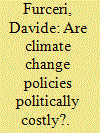| Srl | Item |
| 1 |
ID:
191286


|
|
|
|
|
| Summary/Abstract |
Are policies designed to avert climate change (Climate Change Policies, or CCPs) politically costly? Using data on governmental popular support and the OECD's Environmental Stringency Index covering 30 countries between 2001 and 2015, our results show that CCPs are not necessarily politically costly: policy design matters. First, in contrast to non-market-based CCPs (such as emission limits), only market-based CCPs (such as emission taxes) entail political costs for the government. Second, the effects are only present when CCPs are adopted during periods of high oil prices, prior to elections, or in countries depending strongly on non-green (dirty) energy sources. Third, CCPs are only politically costly when inequality is high and/or social insurance/transfer does not sufficiently address the regressivity of CCPs. Our results are robust to numerous robustness checks including to address concerns related to endogeneity issues.
|
|
|
|
|
|
|
|
|
|
|
|
|
|
|
|
| 2 |
ID:
110018


|
|
|
|
|
| Publication |
2012.
|
| Summary/Abstract |
Why does the EU-China partnership encounter so many problems? What are the causes of these problems? Can they be overcome? What kind of partners are the EU and China? Can the partnership be maintained despite the increasing problems? To answer these questions, the paper will first look at the differences between the EU and China in terms of history, economic development levels, their nation-building trajectories, and their understandings on some key concepts such as sovereignty. In the second section, the paper will then study their strategic visions, economic and trade cooperation, and climate change policies. It will then analyze the challenges in EU-China relations. While there is no doubt that both sides wish for stable bilateral cooperation, the different interests in many areas may interrupt development in one way or another. It is not easy for a genuine partnership to be established between the two.
|
|
|
|
|
|
|
|
|
|
|
|
|
|
|
|